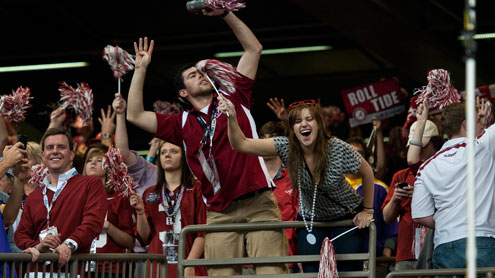 As the excitement of another national championship infiltrates campus, it is impossible to overlook the influence football has on college campuses. Indeed, one recent study shows there is a strong correlation between a successful college football season and declining grade point averages.
As the excitement of another national championship infiltrates campus, it is impossible to overlook the influence football has on college campuses. Indeed, one recent study shows there is a strong correlation between a successful college football season and declining grade point averages.
At the University of Oregon, economists related the schools athletic success with male students’ academic slip-ups.
The study, which was released by the National Bureau of Economic Research, recorded not only the difference in grade point average when the Oregon Ducks’ football team was winning versus losing, but also the gap between males and females.
“Our paper also contributes to the large literature on gender differences in higher education, where some have argued that there is a pending ‘boy crisis,’” said the study. “This concern is often motivated by the fact that men have fallen further and further behind women in college attendance and completion over the past 30 years.”
The study recognized the season outcomes and the fall term grade point averages at the University of Oregon from 1999 until 2007, which provided the researchers with both prosperous and disappointing seasons for Duck fans. According to the study, the main sample consisted of 29,737 students.
Although the study focused on actual numbers and physical evidence, they performed surveys asking students if the success of the University of Oregon football team decreased the amount of time they studied for classes. Students had the option to respond with a range from “Definitely Not” to “Definitely.”
“While both distributions are skewed right, the male distribution shows significantly higher mass to the right, which is consistent with relatively more males reporting a decrease in study time around a football ‘success,’” said the study. “In fact, 24 percent of males report that athletic success either ‘Definitely’ or ‘Probably’ decreases their study time, compared to only 9 percent of females.”
The authors, Jason M. Lindo, Isaac D. Swenson and Glen R. Waddell, explained that there are certain factors that directly affect the study’s findings.
Often, celebrations accompany wins, and frequently, on college campuses, such celebration includes alcohol consumption. They explain that excessive alcohol consumption will lead to poor academic performance. The study reported that only 28 percent of females admit to increased partying when the team wins in comparison to 47 percent of men.
“Relative to women, men report being more likely to increase alcohol consumption, to decrease studying, and to increase partying around the success of the football team,” according to the study. “Yet, both male and female students report that their behavior is responsive to athletic success.”
Although the numbers portrayed a more significant decrease in GPA for male students than females, both genders’ grade point averages at the University of Oregon were altogether lower in successful football seasons.
“I think to a certain extent, my grades are affected in the fall semester due to football season,” said Chelsea Briche, a senior majoring in broadcast journalism. “The entire weekend is dedicated to football. Whether we are in the stands cheering or recovering from game day, it’s all about the Tide. If our team wins, we go out and celebrate. If for some reason our team loses, we then find a way to justify our partying. Because of this, by the time Sunday night rolls around, I don’t exactly have the energy to knock out all of my homework.”
At the University of Alabama, two of the last three football seasons have ended with a national championship title.
“Last season our team’s lack of overall success allowed me to focus more of my time and energy on other things besides football, such as school work,” said Lucas Zaluzney, a UA senior and blogger for Bamabubble.com. “This season Alabama’s national championship run directly affected how much more I partied and cared about football than last year.”
Zaluzney explained that at the end of the Tide’s 2010 football season his GPA was a 3.4, rather than this fall’s 3.1.
According to the UA MTLC lab coordinator Jamie Glass, there are a total of seven classes taught out of the math lab each semester. In comparison to the overall class success rates in the fall of 2009, the fall of 2008 was only more successful in four of the seven classes. In the fall of 2010, there were only three classes with a higher success rate. However, she noted that the MTLC has a different structure than other classes on campus.
“We use an emporium model for teaching introductory mathematics courses. So the students can actually finish their work on their own time,” Glass said. “If they had a rough weekend they can do their work at a later time in the week as long as they keep up with their due dates. Our students are only required to attend class once or twice a week depending on the course.”
Alongside celebrations, the overall atmosphere surrounding football games can also be seen as a distraction.
“It’s difficult to concentrate when you have 70,000 people coming to town and ESPN College GameDay set up outside your window,” advertising and public relations professor Kristen Heflin said. “I haven’t taught long enough to see a trend, but I can definitely understand how people could be distracted by it. It’s like a big carnival coming to town every week.”









